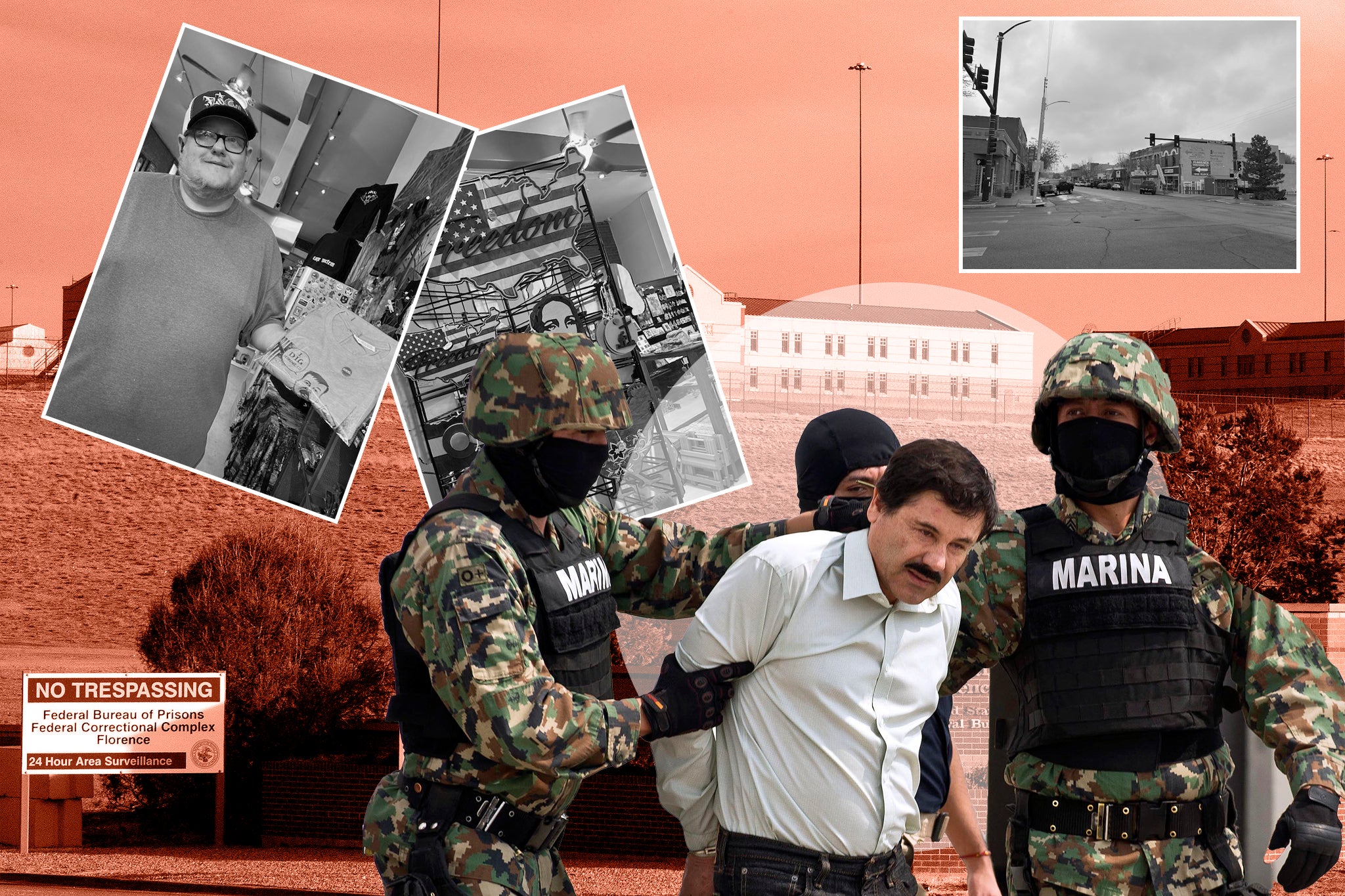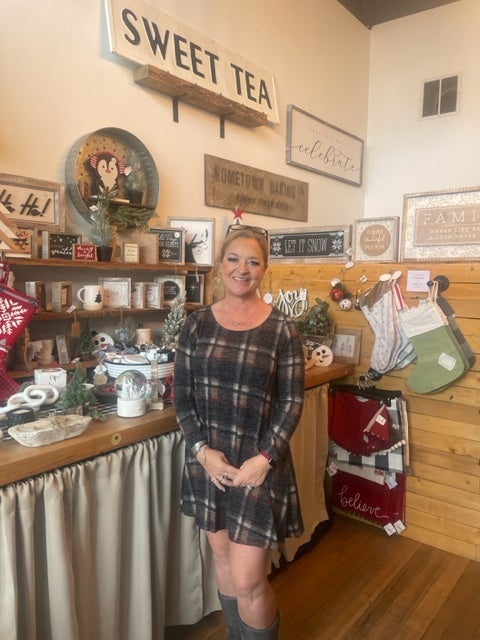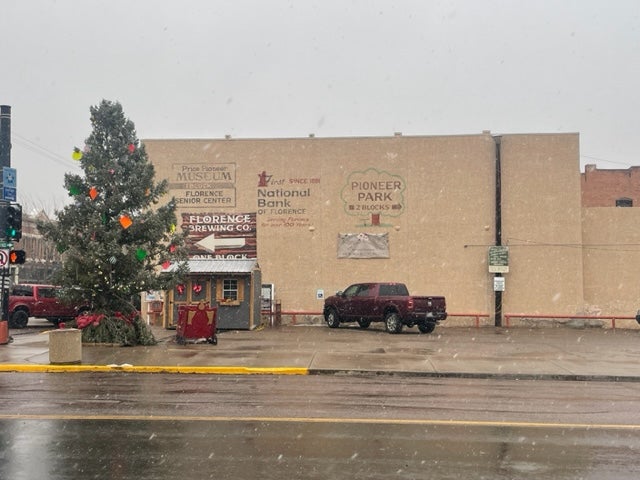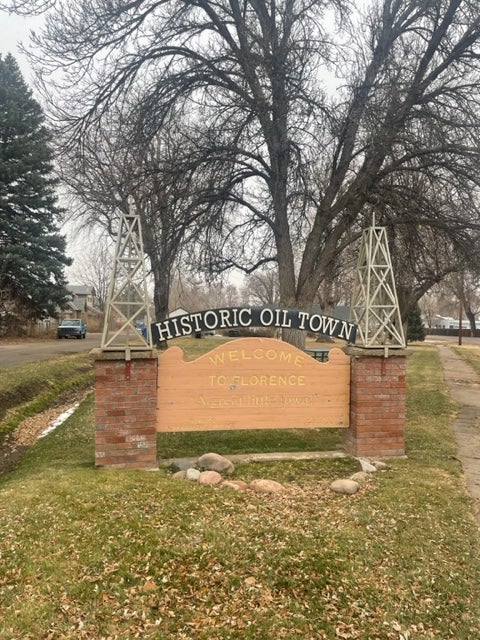Inside the town that’s home to America’s most notorious criminals
The federal Supermax looms large in popular culture, housing the worst of the worst offenders in America – from El Chapo to terrorists and criminal masterminds. The people who live and work nearby in Colorado’s Florence and Fremont County tell Sheila Flynn what it’s like to live in the shadow of the most infamous criminals on the planet

There’s an unmistakable Colorado flare to FloCo Gallery and Gifts on the main street of Florence, a 4,000-person town in the state’s banana belt with a steady stream of tourists who come for the hot springs, antiquing, nearby renowned rafting and Royal Gorge.
The shop is run by two brothers who curate the merchandise with a decidedly local focus – exhibiting area artists, selling their woodworks and botanicals, and even – among the gallery’s far wall of novelty t-shirts – showcasing the very face of perhaps Florence’s most infamous inhabitant.
Because El Chapo, the notorious Mexican drug kingpin and established escapee, is imprisoned exactly 3.5 miles away. He’s joined by some of the world’s most dangerous criminals at the USP Florence ADMAX – known colloquially as the ADX, Supermax or Alcatraz of the Rockies – the highest-security federal prison in the United States.
The new year will mark the 30th anniversary of construction of the prison just outside of Florence, which has found itself quite firmly put on the map as ground zero for the worst of the worst offenders on the planet – serial killers, terrorists, mobsters, spies.

The facility is home to 334 male inmates, many of whom are kept in solitary confinement for 23 hours a day. In addition to El Chapo, imprisoned behind the walls are 9/11 conspirator Zacarias Moussaoui; Ramzi Yousef, convicted in the 1994 World Trade Center bombing; shoe bomber Richard Reid; underwear bomber Umar Abdulmutallab; Ayran Brotherhood prison gang founder Tyler Bingham; Boston bomber Dzhokhar Tsarnaev; Olympics bomber Eric Rudolph; and Oklahoma City bombing conspirator Terry Nichols.
FBI traitor Robert Hanssen died here in June; CIA turncoat Jim Nicholson was released last month.
There’s a long list of notorious names residing alongside the residents of Florence in a facility deemed a “clean version of hell” by a former warden.
But the locals, at this point, really think it’s no big deal.
“Every once in a while we get people who ask about it … is it strange working here – and it’s really not,” Jo Beth Weaver tells The Independent from behind the counter of Aspen Leaf Bakery and Cafe on the town’s main street. “For us, it’s just part of the county.”
That being said, her father-in-law was a plumber on the project when the Supermax was being built. Down the street, another shopkeeper plays pickleball with a woman who works at the federal facility, as does her spouse. Florence Mayor Steve Wolfe, who’s toured the Supermax, is friends with an electrician who did work on the project, coaches sports with men who work at the facility and, as the former high school principal, knows a number of past pupils working there, too.

The pickleball-playing businesswoman also happens to be a retired detective from Indiana who last year opened Essential Blue, a cheerful and quirky Main Street boutique selling candles, home goods and pickleball accessories. She echoes how most residents feel about living in such proximity to violent and dangerous offenders.
“First of all, I mean, no one’s ever broken out – but if they did, they’re not going to stay here,” Michelle Weissenberger tells The Independent. “Why would they stay here? And I’m not sure about the crime statistics, but … I don’t think our crime rate is super big, either, just simply because of all of the employees from the prisons and everything who live in the area.
“Most of those people are going to have guns, carry guns, and if they’re retired, still have guns,” she says. “I know I do.”
The region actually lobbied for the Supermax, decades ago, when the federal Bureau of Prisons was scouting for a new location. Alcatraz had closed in 1963, and a maximum security prison in Marion, Illinois took charge of those offenders deemed most dangerous – until inmates murdered two guards there in 1983, sending the facility into prolonged near-total lockdown and ushering in a new era of super-secure facilities with brutal isolation. The Bureau of Prisons began scouting for a location that would house the most severely locked down facility of all.
Florence, about 40 miles southwest of Colorado Springs, was grappling with recession and a mine closure, so business leaders got together to throw the town’s hat into the ring. Fremont County had an edge; the state prison system had already been established in Canon City, just ten miles from Florence. Ask anyone in town about the Supermax, and they’re likely to bring up local lore about the area’s corrections history. According to the oft-repeated story, two cities – Boulder and Canon City – were vying for either the university or the prison system as Colorado approached statehood before 1876. In some versions, the decision came down to a coin toss.
The regions have not exactly enjoyed similar trajectories; the median house price in Florence in November 2023 was just under $350,000, according to Realtor.com. The same figure in Boulder was nearly $1million more.
Still, though, the Supermax win was a “shot in the arm, from an economy standpoint” for the town, the mayor tells The Independent.
The Bureau of Prisons “had it narrowed down to two or three sites that they were interested in, and they were really wanting to know where they could locate it that would be friendly to the prison – it wouldn’t be a controversial location,” says John Merriam, the retired school superintendent who was president of the chamber of commerce as Florence lobbied for the Supermax. “And the fact that we had several state prisons already in the area, and we had a large number of people from Fremont County working in corrections, kind of indicated to them that we were friendly … and that helped that kind of check the box.”

The community leaders spearheading Florence’s pitch for the site, he says, soon learned, “at that time, that the federal government could not purchase the land; the land had to be donated to the federal prison.”
So Florence and other Fremont County residents ponied up.
“I don’t know who all the big donors were, but I know a lot of individuals were giving $100,” Merriam tells The Independent – eventually raising $142,000 to gift several hundred acres to the BOP, The Pueblo Chieftain reported.
“The whole concept was to generate economy, generate people living here, moving here,” Mr Merriam continues.
Florence was selected with fanfare, the governor and officials flying in for ceremonies, and the initial construction brought a few hundred more residents, the local high school struggling to fit the extra students into “every nook and cranny,” says Mayor Wolfe, who was coaching and teaching at the school, eventually becoming principal.
Supermax employees, though, were permitted to commute from up to an hour away – and the population boon was only temporary. But the enduring impact of the prison on the region has not waned, Merriam says.
“We’re settled in and there’s a sense of stability … the Carl’s Jr down here, they know exactly what they’re going to get. The gas stations know exactly what they’re going to get. It’s become so consistent over the years that they’ve almost figured that into their annual budgets in their economic planning.
“They know that factor’s not going to change. Tourism might, because of all the different things that happen throughout our economy and throughout the country. But we have some stability in this community knowing we have a state penitentiary system, we have a federal penitentiary system, which probably hires, between the two of them, 4-5,000 people.”
There are other knock-on effects for local businesses. Families can purchase items from local vendors to gift prisoners when direct hand-offs are not allowed, Merriam says; there is also regular traffic through the town and its storefronts from friends and relatives visiting inmates, though most don’t advertise it – and most are headed to the lower-security prisons, not the Supermax. The federal complex encompasses four buildings of varying security levels.
“That’s not something they come in and say – hey, I’m here visiting Uncle Rex,” laughs Ms Weaver at Aspen Leaf Bakery.
“We get actually a lot of business from the state prisons and from the Supermax both,” she tells The Independent. “We just had a party of eight in from the prison today.”

The federal complex, from the road, does not look particularly foreboding. There are guard towers and prison yards and low-level buildings, the Rockies in the distance. It’s overlooked by the 150-year-old Union Highland Cemetery and a neighborhood where it’s not unusual to see cop cars parked in driveways and tattered “F*** Joe Biden” banners.
There are new homes for sale with a birds-eye view of the Supermax, with realtor Jay Stoner calling the proximity “sort of a novelty conversational thing.” (While Stoner, incidentally, may have a great surname in a state with legalised weed, conservative Fremont County is dry – there are no recreational marijuana dispensaries to be found.)
“It’s quiet,” he says, repeating the local sentiment of safety: “If there were somebody that broke out, last thing they would do is run towards town – they would want to get away.
“I’ve done a lot of developments, and, you know, you could be next to I-25, or you could be next to a feedlot or a train track, or you could be next to a lot of things,” he tells The Independent. “And if I had my choice, I would be next to a federal penitentiary. It’s not a bad neighbour.”
He continues: “We’ve shown a couple of houses to people that work there, and they think it’s quite nice that it’s so convenient. As far as anybody else is concerned, it didn’t seem to make anybody nervous particularly.”
He certainly correct that the Supermax is a conversation starter in the region and beyond.
“People ask me where I’m from; I say, ‘Florence, Colorado’ and they say, ‘Oh, is that where that Supermax is?’” the mayor tells The Independent, adding: “They would ask me, ‘Do you feel safe?’ Perfectly safe.
“I get a chuckle out of reading novels and the bad guys are locked up at the Supermax facility in Florence,” he says. “So we are known outside of this area for having a Supermax.”

Ms Weaver jokes that she likes to tell people “Ted Bundy is my neighbour,” though she’s slightly mixed up her criminal masterminds named Ted; it was Unabomber Kaczynski, not serial killer Bundy, who was imprisoned at the Supermax until he was transferred to a different federal facility in 2021. He died at that North Carolina prison in June – just five days after his fellow Supermax compatriot, Hanssen, was found dead in his cell in Florence at age 79.
The Supermax has become a draw for some tourists in its own right, FloCo Gallery owner Bobby Davis, 45, tells The Independent.
“This whole community’s rafting and outdoor stuff, and a lot of people do come and look at the prisons,” he chuckles. “They’ll drive by and ask where it’s at.”
“You bring people in, and they always say, ‘Where’s the prison ?’” Merriam says. “So you drive them around and say, “Okay, there’s the Supermax. There’s the USP. And I play golf all the time, and you can see the prison from the golf course.”
While locals might be “desensitized to it,” Mr Davis says, he concedes the town was set atwitter, particularly, when El Chapo showed up – hence the t-shirts, because “he’s the most famous one out there.”
When new prisoners arrive, the mayor says, “there was buzz early on, but now I’m not sure there’s too much … guys down at the coffee shop may talk about it for a day or two.”
In the meantime, the town is focused on progress, its still-robust Chamber of Commerce providing maps of shops and attractions for tourists and seeking out new opportunities. The town has weathered more than a few tempests completely unrelated to the Supermax in recent years; the entire city council resigned in 2022 over a corruption scandal, and both a former city manager and a former councilman narrowly escaped jail themselves after accepting pleas in sexual harassment and assault cases, respectively.

Then, earlier this year, a small plane taking off from Fremont County for a Denver-area airport went down, killing four prominent residents and businesspeople; several of their downtown shops remain shuttered, and the town is still in mourning.
“All of Main Street is like one big family,” says Weaver, describing a town that is close-knit, proud and resilient. “All the shops get along with each other, we refer to each other, people stop for lunch, we go over to their shop … it’s really great.”
The Colorado Department of Transportation is widening the highway from Colorado Springs to Florence, and house prices – while still far below the values seen in Boulder – seem to be creeping up.
“There’s very low crime; there’s hardly any, if any, homelessness,” realtor Stoner says. “The cost of living, cost of real estate, is much less; it’s pretty handy to Colorado Springs, airports and medical facilities. It’s convenient.”
There’s even some tech investment, with the old high school and middle school being taken over by Emergent Campus, envisioned as a “’work, live, play,’ style business campus, with space for incubation, trainings, offices, events, and living quarters,” its website proclaims.
But the prisons, the Supermax and the corrections industry will remain looming large for the foreseeable future – and, three decades after celebrating their win over other sites, residents are happy with that.
“I think the community has taken it ... upon ourselves to be the home of those people who can’t live in a civil world,” Merriam says. “And we take a lot of pride in the fact that we’re willing to host them and house them here for the sake of everyone else’s safety.”
Join our commenting forum
Join thought-provoking conversations, follow other Independent readers and see their replies
Comments
Bookmark popover
Removed from bookmarks